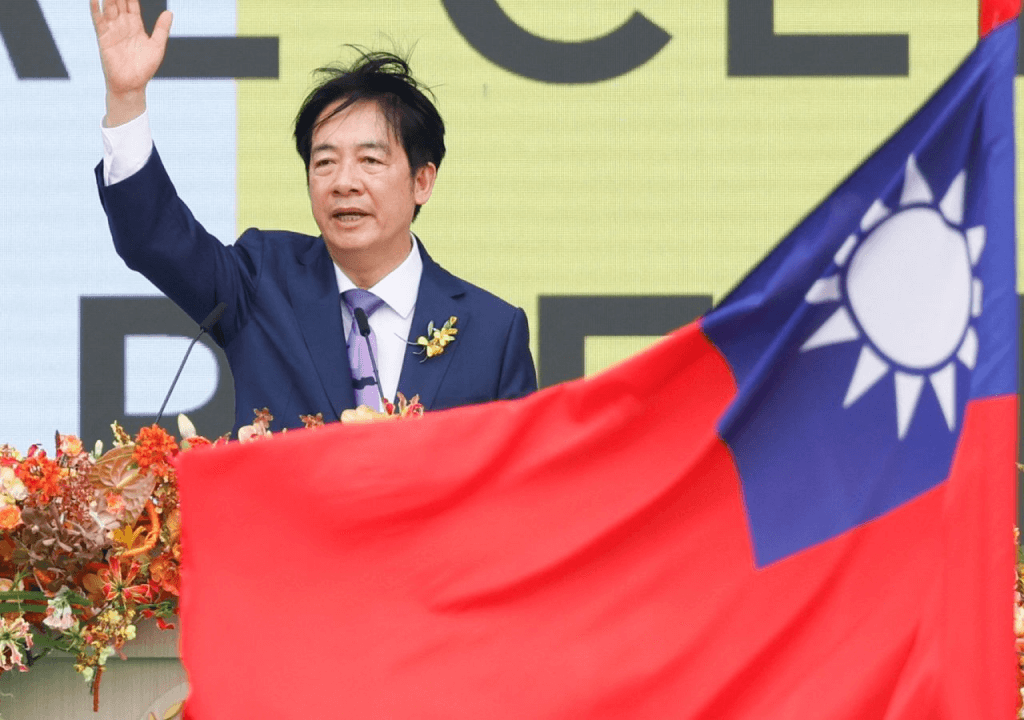Taiwan’s new president, Lai Ching-te, took charge on Monday at the presidential office in central Taipei. Lai won January’s election in a three-way race, but his party, the ruling Democratic Progressive Party (DPP), does not have a legislative majority. Instead, the two major opposition parties, the Kuomintang (KMT) and the Taiwan People’s Party (TPP), now hold the most seats. Lai took over from his predecessor, Tsai Ing-wen, whom he had served as vice-president. Both Lai and the new vice-president, Hsiao Bi-Khim, who previously served as Taiwan’s top envoy to Washington, and championed Taiwan’s sovereignty. Lai, known for his tougher stance against Beijing in the past, called for an independent Taiwan. However, now he seems to advocate a more moderate policy path focused on protecting the status quo, maintaining Taiwan’s sovereignty, and deterring Chinese aggression. During his inauguration speech at the Imperial Stadium, he did not avoid criticizing China and its interest in Taiwan, which assured discontent in mainland China.
Lai Ching-te urged China to “cease their political and military intimidation against Taiwan and to keep the world free from the fear of more war” in his inauguration speech. This strong warning could preclude the possibility of diplomatic resolutions through talks between Chinese and Taiwanese leaders. Lai’s speech affirmed the administration’s plans to build up its defensive and deterrent measures as tensions rise in the region and the United States increases its efforts to counter China. The President also cautioned his people not to harbor any delusions about China, especially as protests against bills in parliament, which the government considers influenced by China, continue to rise.
Many experts believe that through his inauguration speech, Lai promotes Taiwanese identity over Chinese identity. Tsai, Lai’s predecessor, often relied on the ambiguities within the Taiwan Constitution, especially regarding the concept of “One China”. Beijing asserts that this concept includes Taiwan under PRC rule, with both sides identifying themselves as China. She often referred to the “two sides of the Strait” instead of using the names of the two countries, avoiding complications since both countries officially use the name “China”. In contrast, Lai’s speeches rejected some of these ambiguities in favor of explicit statements. He asserted that the constitution clearly says “ The Republic of China and the People’s Republic of China are not subordinate to each other”. However, Lai has previously demonstrated skepticism regarding the Republic of China (ROC) constitution as the basis for cross-strait affairs. While Lai promoted greater Taiwanese pride during his inauguration speech, he also stated that he would work towards resuming tourism between Taiwan and China, which is currently under tight restrictions. Many people in Taiwan have social, cultural and business ties with Mainland China and desire a return to a friendly relationship, even though they do not support Beijing’s unification plan.
Lai’s takeover and inauguration speech definitely made Beijing uncomfortable. China has reportedly set a goal of being capable of militarily taking over Taiwan by 2027, and the recent Two Sessions continue to work towards reunification. This timeframe falls within Lai Ching-te’s first term, and having a leader like Lai in Taipei during this period will surely challenge the Chinese dream. In the past, Beijing has employed various methods to pressure Taiwan into accepting annexation, including economic coercion, propaganda drives, diplomatic isolation, and military showdowns. All these actions are expected to continue. China claims democratic Taiwan as a province and has labeled Lai a “Dangerous Separatist” who will bring “War and Decline” to the Chinese island. The Chinese Communist Party and People’s republic of China established in 1949 has never ruled over Taiwan, but Xi Jinping has declared that what he terms “Reunification” is inevitable, as communist party wishes to extend China with all Sinosphere including the regions now including neighboring states.
An entire page of the national party newspaper, China Daily, was devoted to Beijing’s response on Tuesday. Beijing has warned of undefined reprisals against Taiwan and expressed their strong discontent on the inauguration speech of new president Lai Ching-te, in which he maintained his government’s position on sovereignty , uprise Taiwanese identity and did not concede to Beijing’s claim that Taiwan is a province of China. In a statement late Tuesday, China’s Taiwan Affairs Office (TAO) called Lai’s speech “A downright confession of Taiwan independence”. The TAO emphasized reunification and warned they would counterattack and punish the DPP authorities for colluding with external forces to pursue “independence” provocations. Beijing also noted that any speech by a president belonging to the DPP, Lai’s party, short of capitulating to that position was likely to provoke an angry response.
While the DPP and President Lai Ching-te focus on issues with China and Tensions in the South China Sea, many believe the government is using this to cover up the real issues in Taiwan. Domestic challenges are rising, including housing costs, the wealth divide, and cost of living pressures. His inauguration was marked by large protests against the opposition over a controversial bill in parliament, foreshadowing a difficult first term for Lai, who lacks a legislative majority. There were protests against the bill in the parliament and in the streets. The government is adeptly using anti-China sentiment to suppress these protests, similar to tactics in authoritarian countries, labeling those who oppose the governments as anti-nationals. Many fear that Taiwan is sacrificing democracy in the name of protecting itself from communism.








